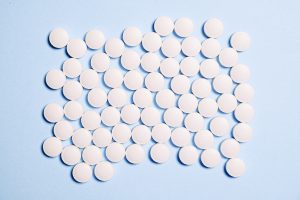
 DRUG ALERT
DRUG ALERT  – High potency Benzodiazepine tablets
– High potency Benzodiazepine tablets
Round, white, unmarked tablets – likely sold as ‘Mylan’ or ‘Xanax’ – are circulating in Victoria. They contain five novel…
DXM or dextromethorphan is an over-the-counter cough suppressant commonly sold at pharmacies. DXM acts as a dissociative drug when taken at doses higher than what is recommended in cough medicines.1 It is described as having more psychedelic effects than other dissociatives (such as ketamine or PCP) and its effects depend heavily on the dosage.1 DXM is commonly categorised into four or five dose “plateaus” where the effects are different according to the dose.1 People often experience relaxation and increased music appreciation at lower plateaus while higher plateaus can cause intense dissociation, hallucinations and out-of-body experiences.1
To achieve the recreational effects, people often drink a large volume of cough syrup or swallow a large amount of cough gels/lozenges.1 This can be an unpleasant experience as the dyes, flavourings, sweeteners, and thickening agents can taste bad as well as cause stomach discomfort, nausea, diabetes complications, vomiting and diarrhea (particularly sugar alcohols such as sorbitol and mannitol).1,2
It is extremely important to check all the ingredients in the cough medicine before taking it. DXM is found in many over-the-counter cough formulations alongside other pharmaceutical drugs such as paracetamol, guaifenesin, antihistamines, and pseudoephedrine.1 Taking cough medicines at high doses may cause undesirable side effects or overdoses associated with these other active ingredients.1 Do not try to take cough medicines containing paracetamol recreationally as it is likely to cause potentially fatal liver damage.3 Guaifenesin can cause nausea, vomiting and kidney stones (after repeated doses).1,4 Antihistamines can cause dizziness, hallucinations, serotonin syndrome and dysphoria as well as liver, kidney and heart complications especially when taken alongside DXM.1
The effects of DXM can vary from person to person, but the commonly reported effects are as follows:1,5
The effects of DXM can last anywhere 8-12 hours in total, with a come up typically lasting 60-120 minutes and a peak lasting 5-6 hours.5 People also describe experiencing an “afterglow” or feeling “out-of-it”, tired and “brain-dead” for up to 72 hours following a high dose of DXM.1
A general rule of thumb people follow is “no more than one plateau per week”.1 That is, wait at least three weeks after a third plateau experience or at least two weeks after a second plateau experience before taking DXM again.1 For a more detailed overview of the differences between the subjective effects at each dose plateau, please visit: https://wiki.tripsit.me/wiki/DXM#Plateaus
DXM is sold in two forms: dextromethorphan hydrobromide (a.k.a. DXM HBr) and dextromethorphan polistirex.1 DXM polistirex is the slow-release form, so its effects last significantly longer and more of it may be converted into dextrorphan (DXO) in the liver, reportedly making the effects less intense and causing more of a “body high”.1
It is always recommended to start at a low dose and wait before redosing recreational drugs (start low and go slow). Remember that redosing will have more potent effects than the first dose which is known as a stacking effect. Redosing DXM at high doses is not recommended since it can lead to an experience commonly called “plateau sigma”, which has been described as “dark, dysphoric, confusing” and is very rarely reported to be pleasurable.1
The doses required to reach the desired plateau for DXM HBr depend on bodyweight and are as follows:1
FIRST PLATEAU – 1.5-2.5 mg/kg
SECOND PLATEAU – 2.5-7.5 mg/kg
THIRD PLATEAU – 7.5-15 mg/kg
FOURTH PLATEAU – 15-20 mg/kg
An online dosage calculator is available here: https://dxm.tripsit.me/
Some people drink ~500 mL of grapefruit juice 1-2 hours before dosing DXM to inhibit the liver enzyme that converts DXM to DXO.1 This can lead to a “trippier”, more psychedelic high with less bodily effects (such as enhanced touch sensation).1 It is important to note that grapefruit juice also affects the body’s ability to process other drugs and may increase the risk of dangerous interactions with DXM.1
The complications of DXM overdose increase greatly when DXM is taken alongside other pharmaceutical drugs, including those found in cough medicines.1 The overdose effects of DXM include:5,6
Serotonin syndrome is a potentially life-threatening condition resulting from too much serotonin in the brain.7 DXM inhibits the reuptake of serotonin and promotes its release in the brain.8 Hence, taking DXM alongside other drugs that increase serotonin levels in the brain greatly increases the risk of serotonin syndrome.7 This includes SSRIs/antidepressants (e.g., fluoxetine and escitalopram), opioids, MDMA and some supplements (e.g., St John’s Wort).7 DXM formulations containing chlorphenamine (an antihistamine) also increase the risk of serotonin syndrome for this reason.8
The symptoms of serotonin syndrome include:6,7
Some people choose to chemically extract DXM so they can take the drug in its pure form.1,9 While taking pure DXM alone is safer than taking DXM alongside the other ingredients in cough medicines, most people don’t have the necessary equipment to extract DXM safely.1 The organic solvents used in the extraction process (e.g., shellite/naphtha or lighter fluid) are neurotoxic and require proper ventilation to prevent brain damage (such as a fume hood or respirator).9,10
[1] https://wiki.tripsit.me/wiki/DXM
[3] https://doi.org/10.1124/dmd.31.12.1499
[4] https://doi.org/10.1089/acm.2004.10.967
[5] https://psychonautwiki.org/wiki/Dextromethorphan
[6] https://doi.org/10.1093/jat/33.2.99
[7] https://doi.org/10.1056/NEJMra041867
[8] https://doi.org/10.1111/j.1365-2125.2010.03747.x
[9] https://erowid.org/chemicals/dxm/faq/dxm_chemistry.shtml
[10] https://doi.org/10.1002/ajim.4700140608
Written by Darcy Lynch

 DRUG ALERT
DRUG ALERT  – High potency Benzodiazepine tablets
– High potency Benzodiazepine tabletsRound, white, unmarked tablets – likely sold as ‘Mylan’ or ‘Xanax’ – are circulating in Victoria. They contain five novel…

About Meth Methamphetamine (also called methylamphetamine or meth among other names) is a powerful stimulant drug which is chemically related…

About Tiletamine Tiletamine is a dissociative anaesthetic used in veterinary medicine to immobilise, sedate or anaesthetise animals for surgery, most…